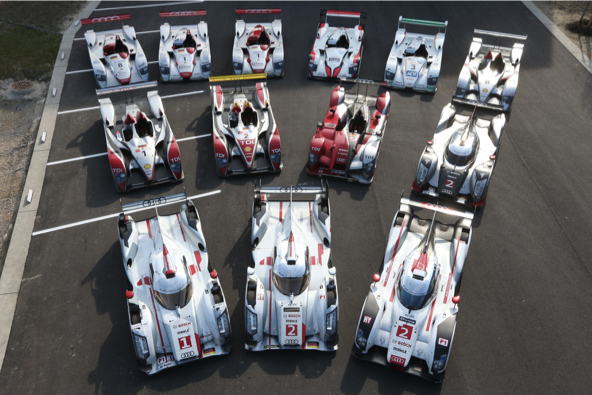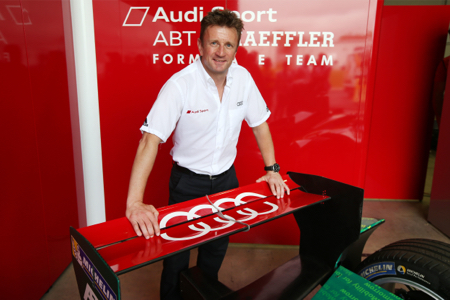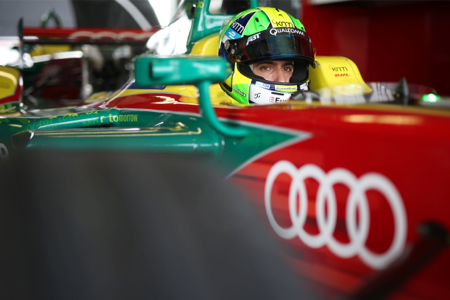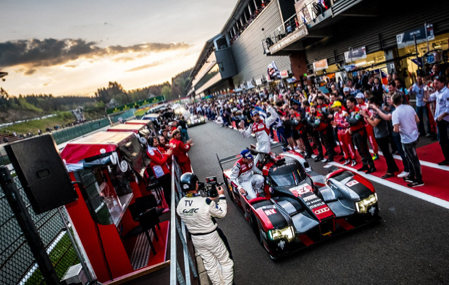Audi quits Le Mans and WEC 26 | 10 | 2016

AUDI HAS CONFIRMED it is quitting the World Endurance Championship and Le Mans 24-Hours, which it won on 13 occasions, at the end of 2016 to concentrate on the all-electric Formula E Championship next year. Double Le Mans winner with Audi, Scot Allan McNish (pictured below), has already switched to co-ordinate the Formula E project for Audi Sport.
Audi’s decision comes in the wake of the dieselgate emissions disaster which is poised to cost the VW Group a minimum of $14 billion in settlement payments in the US.
Speaking to 300 employees of the motorsport department this morning, all of whom will be retained to work on the Formula E project, Chairman of the Board of Management Rupert Stadler put this strategic decision in the context of the current burdens on the brand, pointing out that it was important to focus on the things that would keep Audi competitive in the years ahead.
“We’re going to contest the race for the future on electric power," he said. "As our production cars are becoming increasingly electric, our motorsport cars, as Audi’s technological spearheads, have to even more so.”

“The first all-electric racing series perfectly matches the strategy of offering fully battery-electric models year-by-year starting in 2018, Audi currently being in the greatest transformation stage in the company’s history.
“The commitment in FIA Formula E will begin in 2017. It is regarded as the racing series with the greatest potential for the future. That is why Audi has intensified the existing partnership with Team ABT Schaeffler Audi Sport in the current 2016/2017 season. On the road toward a full factory commitment, the manufacturer is now actively joining the technical development.”
The commitment in the DTM, where Audi will be competing with the successor of the Audi RS 5 DTM in 2017, will remain untouched.
In mid-October, the premium brand won the manufacturers’ and teams’ classifications. In 2013, Mike Rockenfeller most recently brought the title of DTM Champion home for the four rings.

The departure from the FIA World Endurance Championship (WEC) marks the end of a successful era. For 18 years, the brand was active in Le Mans prototype racing. During this period, it won the Le Mans 24 Hours 13 times (Audi's Le Mans-winning cars in main photo) and set numerous technical milestones.
At Le Mans, Audi clinched the first victory of a TFSI engine (2001), the first success of a race car with a TDI engine (2006), plus the first triumph of a sports car with a hybrid powertrain (2012).
In the brand’s 185 races contested to date, Audi’s Le Mans prototypes have achieved 106 victories, 80 pole positions and 94 fastest race laps. On two occasions, Audi won the FIA World Endurance Championship (WEC) with the Audi R18 e-tron quattro race car.
In addition, from 2000 to 2008, Audi, nine times in succession, secured the title in the American Le Mans Series (ALMS), the world’s most important racing series for Le Mans prototypes at the time.
“After 18 years in prototype racing that were exceptionally successful for Audi, it’s obviously extremely hard to leave,” Head of Audi Motorsport Dr. Wolfgang Ullrich, said today.
“Audi Sport Team Joest shaped the WEC during this period like no other team. I would like to express my thanks to our squad, to Reinhold Joest and his team, to the drivers, partners and sponsors for this extremely successful cooperation. It’s been a great time!”

The decision to end Audi’s commitment to LMP1 WEC racing is also tied to a decision made by the VW Group to no longer showcase its diesel engine technology in a motorsport environment in the aftermath of its diesel emission manipulation scandal.
It also follows a decision by Volkswagen chairman Matthias Müller to reduce the number of diesel engines across the group in favour of petrol-electric hybrid and pure electric systems.
In recent years, Audi’s WEC contenders have run a diesel-electric hybrid system, which has no direct connection with the technology in its road cars.
The imminent introduction of new driveline regulations for LMP1 cars in 2018 will also have played significant part in Audi's decision. Because cars competing in the premier class of endurance racing will be required to meet a 10 megajoule rule, Audi would have have been required to carry out a major revision of the turbocharged 3.7-litre V6 diesel engine and electric motor application used by the existing Audi R18 e-tron quattro that runs under the 6 megajoule rule, including the adoption of a second kinetic energy recuperation system.
Related: Jarvis — I'd give up my podium for Toyota
Keep up-to-date with all the latest news by following us on twitter.com/Scotcars
Jim McGill